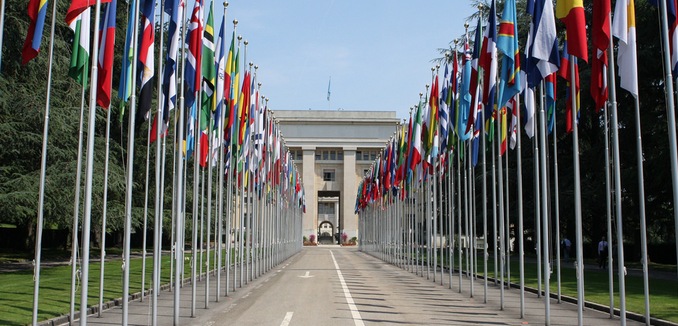The United States on Monday boycotted the United Nation’s Human Rights Council over its disproportionate focus on Israel, saying this “long-standing bias” severely jeopardizes the organization’s credibility.
Israel is the only country that has its record examined during each of the council’s three annual meetings under a standing agenda item, known as Item 7, which examines the “human rights situation in Palestine and other occupied Arab territories.” The council’s current session ends Friday and is expected produce at least five anti-Israel resolutions, as well as seven on the rest of the world combined.
“The United States will vote against every resolution put forth under this agenda item and is encouraging other countries to do the same,” the State Department said in a statement. “Today’s actions in the Council are yet another reminder of that body’s long-standing bias against Israel. No other nation has an entire agenda item dedicated to it at the Council.”
“As an expression of our deeply-held conviction that this bias must be addressed in order for the Council to realize its legitimate purpose, the United States decided not to attend the Council’s Item Seven General Debate session,” the statement continued.
U.S. ambassador to the UN Nikki Haley harshly denounced the council’s record on Israel, noting that its primary target “is not Syria, where the regime has systematically slaughtered and tortured its own people. It is not Iran, where public hangings are a regular occurrence. It is not North Korea, where the regime uses forced labor camps to crush its people into submission. It is Israel, the only democracy in the Middle East.”
The U.S. decision is part of the Trump administration’s ongoing effort to encourage reform at the UNHRC, which includes member countries accused of severe human rights violations.
During her confirmation hearing in January, Haley slammed the UN’s “outrageous bias against our close ally Israel,” and specifically mentioned that in the past ten years since its founding, the UNHRC “has passed 62 resolutions condemning the reasonable actions Israel takes to defend its security. Meanwhile, the world’s worst human rights abusers in Syria, Iran, and North Korea received far fewer condemnations. This cannot continue.”
In a letter last week to nine advocacy groups that urged the U.S. to remain on the UNHRC, Secretary of State Rex Tillerson warned that “While it may be the only such organization devoted to human rights, the Human Rights Council requires considerable reform in order for us to continue to participate.”
He added that the U.S. would not withdraw from the UNHRC for the time being, but that its representatives would “reiterate our strong principled objection to the Human Rights Council’s biased agenda against Israel.”
Haley last week blasted a report issued by the United Nations Economic and Social Commission for Western Asia (ESCWA), a UN agency comprising 18 Arab states, which accused Israel of pursuing discriminatory policies against the Palestinians. UN Secretary-General António Guterres also distanced himself from the report, which was co-authored by 9/11 conspiracy theorist Richard Falk.
Guterres demanded on Friday that ESCWA remove the report from its website, causing the head of the agency, Jordanian diplomat Rima Khalaf, to resign in protest.
Hillel Neuer, head of UN Watch, credited Haley’s strong stand against the report with its disavowal by Guterres and eventually removal, saying, “there is no question that the initial moral voice here was that of U.S. ambassador Nikki Haley, and that it was U.S. leverage which prompted the UN to act.”
The UN has long been accused of having an entrenched bias against the Jewish state. In 2016, the UN General Assembly adopted 20 resolutions against Israel and only six on the rest of the world combined, according to UN Watch.
In December, then-Secretary-General Ban Ki-moon acknowledged his organization’s bias against Israel, saying, “Decades of political maneuvering have created a disproportionate number of resolutions, reports and committees against Israel.” Ban also criticized the UNHRC’s singular focus on Israel shortly after assuming his post in 2007, saying that he was “disappointed at the council’s decision to single out only one specific regional item, given the range and scope of allegations of human rights violations throughout the world.”
The Associated Press reported in June that one of the driving forces behind the UN’s focus on Israel is the influential Organization for Islamic Cooperation, which often spearheads the push for anti-Israel resolutions.
[Photo: Henry Mühlpfordt / Flickr ]




